抗生素滥用论文 英文
滥用抗生素英语作文
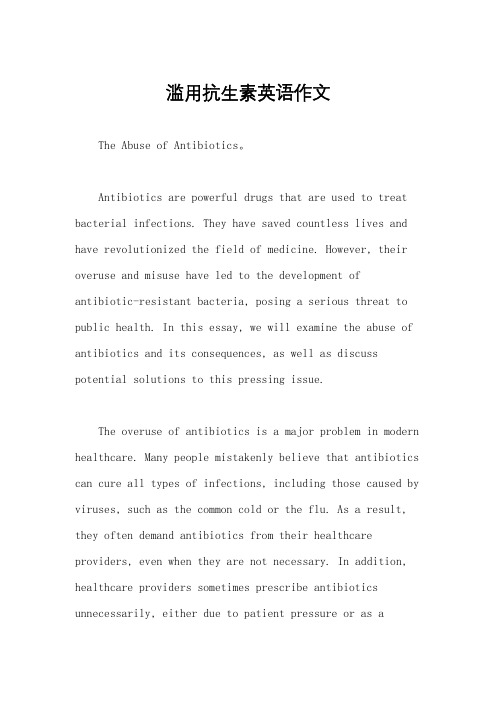
滥用抗生素英语作文The Abuse of Antibiotics。
Antibiotics are powerful drugs that are used to treat bacterial infections. They have saved countless lives and have revolutionized the field of medicine. However, their overuse and misuse have led to the development ofantibiotic-resistant bacteria, posing a serious threat to public health. In this essay, we will examine the abuse of antibiotics and its consequences, as well as discuss potential solutions to this pressing issue.The overuse of antibiotics is a major problem in modern healthcare. Many people mistakenly believe that antibiotics can cure all types of infections, including those caused by viruses, such as the common cold or the flu. As a result, they often demand antibiotics from their healthcare providers, even when they are not necessary. In addition, healthcare providers sometimes prescribe antibiotics unnecessarily, either due to patient pressure or as aprecautionary measure. This widespread misuse ofantibiotics has led to the development of antibiotic-resistant bacteria, which are much more difficult to treat and can cause serious and even life-threatening infections.The consequences of antibiotic resistance are far-reaching. Infections that were once easily treated with antibiotics are now becoming increasingly difficult to manage. This not only leads to prolonged illness and suffering for patients, but also increases healthcare costs and the burden on healthcare systems. Furthermore,antibiotic resistance can have a significant impact on public health, as it can lead to the spread of infectious diseases that are difficult to control. If this trend continues, we may soon find ourselves in a world where common infections are no longer easily treatable, and routine medical procedures, such as surgery and chemotherapy, become much riskier due to the increased likelihood of infection.To address the abuse of antibiotics, it is essential to raise awareness about the problem and educate bothhealthcare providers and the general public about the appropriate use of these drugs. Healthcare providers should be encouraged to only prescribe antibiotics when they are truly necessary, and patients should be informed about the risks of antibiotic resistance and the importance of completing the full course of antibiotics as prescribed. In addition, there is a need for better diagnostic tools to help healthcare providers distinguish between bacterial and viral infections, so that antibiotics are only used when they are truly needed.Furthermore, there is a need for more research and development of new antibiotics and alternative treatments for bacterial infections. The development of newantibiotics has been slow in recent years, and there is a growing need for new drugs to combat antibiotic-resistant bacteria. In addition, alternative treatments, such as phage therapy and probiotics, show promise in the fight against antibiotic resistance and should be further explored and developed.In conclusion, the abuse of antibiotics is a seriousand growing problem that poses a significant threat to public health. It is essential that we take action to address this issue, through education, research, and the development of new treatments. By working together to combat antibiotic resistance, we can ensure that theselife-saving drugs remain effective for generations to come.。
滥用抗生素作文英文

滥用抗生素作文英文英文:Antibiotic abuse is a serious issue that has been affecting the health of people around the world. As a healthcare professional, I have seen firsthand the consequences of this abuse. Antibiotics are meant to beused to treat bacterial infections, but they are often prescribed for viral infections, such as the common cold. This is a problem because antibiotics do not work against viruses, and their misuse can lead to antibiotic resistance.Antibiotic resistance is when bacteria become resistant to antibiotics, making it harder to treat infections. This can lead to longer hospital stays, higher healthcare costs, and even death. One example of antibiotic abuse is when a patient demands antibiotics for a viral infection, even though they are not necessary. In this situation, the healthcare provider may feel pressured to prescribe antibiotics to satisfy the patient, even though it goesagainst their medical judgment.Another example is when antibiotics are used in animal agriculture to promote growth and prevent disease. This can lead to the development of antibiotic-resistant bacteria in animals, which can then be transmitted to humans through the food chain. This is a serious public health concern, and efforts are being made to reduce the use of antibiotics in animal agriculture.Overall, antibiotic abuse is a complex issue that requires a multifaceted approach to address. It is important for healthcare providers to educate theirpatients about the appropriate use of antibiotics and for policymakers to implement regulations to reduce the use of antibiotics in animal agriculture. By working together, we can help prevent the spread of antibiotic-resistant bacteria and protect the health of our communities.中文:抗生素滥用是一个严重的问题,影响着全球人民的健康。
抗生素滥用英文作文

抗生素滥用英文作文英文回答:Antibiotic misuse is the incorrect or excessive use of antibiotics. This can include taking antibiotics when they are not necessary, taking them incorrectly, or taking them for too long. Antibiotics are powerful drugs that can kill or stop the growth of bacteria. However, they are only effective against bacterial infections, and they are not effective against viral infections.Antibiotic misuse can have serious consequences. It can lead to antibiotic resistance, which is when bacteria become resistant to the effects of antibiotics. This can make it difficult or impossible to treat bacterial infections in the future. Antibiotic misuse can also cause side effects, such as diarrhea, nausea, vomiting, and allergic reactions. In some cases, antibiotic misuse can even be fatal.There are a number of things that can be done to reduce antibiotic misuse. These include:Only taking antibiotics when they are prescribed by a doctor.Taking antibiotics exactly as directed by your doctor.Not taking antibiotics for viral infections.Not sharing antibiotics with others.Finishing the entire course of antibiotics, even if you start to feel better.Talking to your doctor about any concerns you have about antibiotic use.By following these steps, you can help to reduce antibiotic misuse and protect your health.中文回答:抗生素滥用是指不正确或过度使用抗生素。
抗生素滥用英文作文
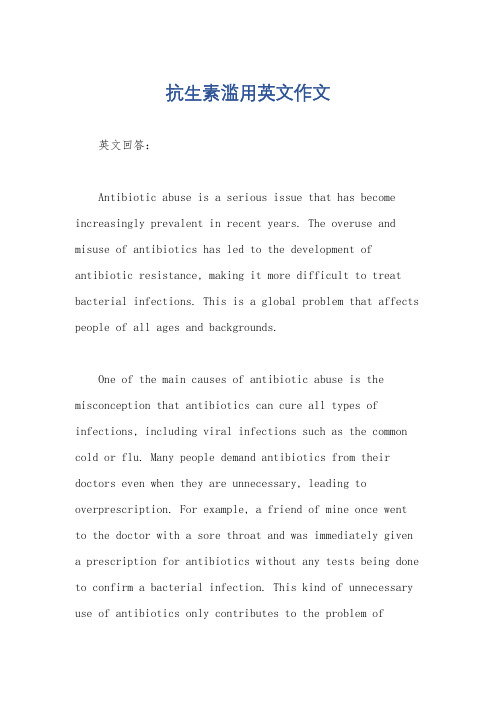
抗生素滥用英文作文英文回答:Antibiotic abuse is a serious issue that has become increasingly prevalent in recent years. The overuse and misuse of antibiotics has led to the development of antibiotic resistance, making it more difficult to treat bacterial infections. This is a global problem that affects people of all ages and backgrounds.One of the main causes of antibiotic abuse is the misconception that antibiotics can cure all types of infections, including viral infections such as the common cold or flu. Many people demand antibiotics from their doctors even when they are unnecessary, leading to overprescription. For example, a friend of mine once went to the doctor with a sore throat and was immediately given a prescription for antibiotics without any tests being done to confirm a bacterial infection. This kind of unnecessary use of antibiotics only contributes to the problem ofantibiotic resistance.Another cause of antibiotic abuse is the improper use of antibiotics. Some people may not follow the prescribed dosage or duration of treatment, stopping the medication as soon as they feel better. This can also contribute to the development of antibiotic resistance. For instance, afamily member of mine once stopped taking their antibiotics after just a few days because they felt better, even though the doctor had prescribed a full course of treatment. This improper use of antibiotics can lead to the survival of bacteria that are resistant to the medication, making it harder to treat infections in the future.Furthermore, the use of antibiotics in animal agriculture is another major contributor to antibiotic abuse. Antibiotics are often used in large quantities to promote growth and prevent disease in livestock. This widespread use of antibiotics in animals can lead to the spread of antibiotic-resistant bacteria through the food chain. For example, if a person consumes meat from an animal that was treated with antibiotics, they mayunknowingly ingest antibiotic-resistant bacteria. This can have serious consequences for human health.中文回答:抗生素滥用是一个严重的问题,在近年来变得越来越普遍。
对抗生素的态度的英语作文
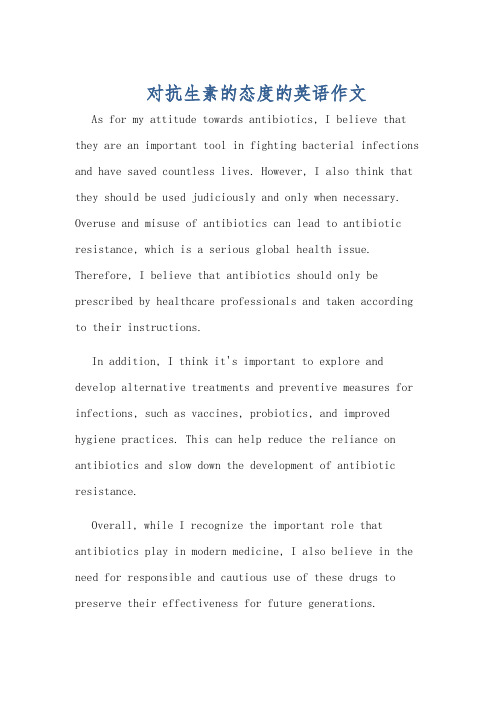
对抗生素的态度的英语作文As for my attitude towards antibiotics, I believe that they are an important tool in fighting bacterial infections and have saved countless lives. However, I also think that they should be used judiciously and only when necessary. Overuse and misuse of antibiotics can lead to antibiotic resistance, which is a serious global health issue. Therefore, I believe that antibiotics should only be prescribed by healthcare professionals and taken according to their instructions.In addition, I think it's important to explore and develop alternative treatments and preventive measures for infections, such as vaccines, probiotics, and improved hygiene practices. This can help reduce the reliance on antibiotics and slow down the development of antibiotic resistance.Overall, while I recognize the important role that antibiotics play in modern medicine, I also believe in the need for responsible and cautious use of these drugs to preserve their effectiveness for future generations.对于抗生素,我认为它们是对抗细菌感染的重要工具,拯救了无数生命。
抗生素滥用英文作文

抗生素滥用英文作文English:The misuse or overuse of antibiotics has become a significant global health concern. This issue arises when antibiotics are prescribed unnecessarily, taken incorrectly, or used in agriculture and livestock. The misuse of antibiotics can lead to the development of antibiotic-resistant bacteria, making infections harder to treat and increasing the risk of spreading resistant bacteria to others. In addition, when antibiotics kill off the good bacteria in our bodies, it can disrupt the balance of our microbiome and lead to various health problems, such as digestive issues and weakened immune system. Furthermore, the overuse of antibiotics in agriculture can result in antibiotic residues in food products, which can have negative impacts on human health. It is crucial for healthcare providers, policymakers, and the general public to work together to educate themselves about the appropriate use of antibiotics and to implement strategies to combat antibiotic misuse.中文翻译:抗生素的滥用或过度使用已成为一个全球性重要的健康问题。
乱用抗生素的危害作文英语

乱用抗生素的危害作文英语The Hazards of Overusing Antibiotics。
Antibiotics have been one of the greatest discoveriesin modern medicine. They have saved countless lives and have been used to treat a wide range of bacterial infections. However, the overuse and misuse of antibiotics have led to the emergence of antibiotic-resistant bacteria, which pose a significant threat to public health. In this essay, I will discuss the hazards of overusing antibiotics and the importance of using them responsibly.Antibiotic resistance is a growing problem worldwide. When antibiotics are overused or misused, bacteria can develop resistance to them. This means that the antibiotics are no longer effective in killing the bacteria, and the infections they cause become much more difficult to treat. In some cases, antibiotic-resistant infections can be deadly.The overuse of antibiotics is a major contributor tothe development of antibiotic-resistant bacteria. For example, antibiotics are often prescribed for viral infections, such as the common cold, even though they arenot effective against viruses. This means that people are taking antibiotics unnecessarily, which increases the riskof developing antibiotic-resistant bacteria.Another factor contributing to the overuse ofantibiotics is the use of antibiotics in animal agriculture. Antibiotics are often used to promote growth and prevent disease in livestock, even when the animals are not sick. This has led to the development of antibiotic-resistant bacteria in animals, which can then be passed on to humans through the food chain.The misuse of antibiotics is also a significant problem. Some people stop taking antibiotics as soon as they start feeling better, even if they haven't completed the full course of treatment. This can lead to the development of antibiotic-resistant bacteria, as the bacteria may not be completely eradicated from the body. Other people may takeantibiotics that have been prescribed for someone else, or share antibiotics with others. This can also lead to the development of antibiotic-resistant bacteria.To address the problem of antibiotic resistance, it is important to use antibiotics responsibly. This means only using antibiotics when they are necessary, and taking them exactly as prescribed. It also means avoiding the use of antibiotics in animal agriculture unless they are necessary for the treatment of sick animals.In conclusion, the overuse and misuse of antibiotics have led to the emergence of antibiotic-resistant bacteria, which pose a significant threat to public health. It is important to use antibiotics responsibly to prevent the development of antibiotic-resistant bacteria and to ensure that antibiotics remain effective in treating bacterial infections. We all have a role to play in this effort, and we must work together to protect ourselves and future generations from the hazards of overusing antibiotics.。
乱用抗生素的危害英语作文
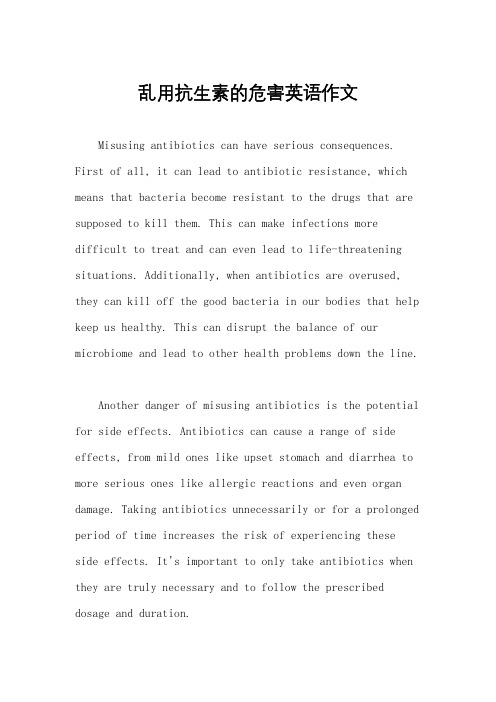
乱用抗生素的危害英语作文Misusing antibiotics can have serious consequences. First of all, it can lead to antibiotic resistance, which means that bacteria become resistant to the drugs that are supposed to kill them. This can make infections more difficult to treat and can even lead to life-threatening situations. Additionally, when antibiotics are overused, they can kill off the good bacteria in our bodies that help keep us healthy. This can disrupt the balance of our microbiome and lead to other health problems down the line.Another danger of misusing antibiotics is the potential for side effects. Antibiotics can cause a range of side effects, from mild ones like upset stomach and diarrhea to more serious ones like allergic reactions and even organ damage. Taking antibiotics unnecessarily or for a prolonged period of time increases the risk of experiencing these side effects. It's important to only take antibiotics when they are truly necessary and to follow the prescribed dosage and duration.Furthermore, the misuse of antibiotics can have a negative impact on the environment. When antibiotics are excreted by humans and animals, they can end up in the water supply. This can lead to the development ofantibiotic-resistant bacteria in the environment, which can then spread to humans and animals. It's a vicious cyclethat can have far-reaching consequences for both our health and the health of the planet.In addition to these immediate dangers, the overuse of antibiotics can also have long-term effects on public health. As antibiotic resistance becomes more widespread,it becomes harder to treat common infections. This means that simple infections that were once easily cured with antibiotics can become life-threatening. It also increases the risk of complications during surgeries and other medical procedures. If we continue to misuse antibiotics, we could be facing a future where even the most basic medical interventions become risky and uncertain.In conclusion, the misuse of antibiotics is a seriousissue that can have wide-ranging consequences. Fromantibiotic resistance to side effects, environmental impact, and long-term public health risks, the dangers of misusing these drugs cannot be overstated. It's crucial that we use antibiotics responsibly and only when necessary, in orderto preserve their effectiveness for future generations.。
关于抗生素的高三英语作文
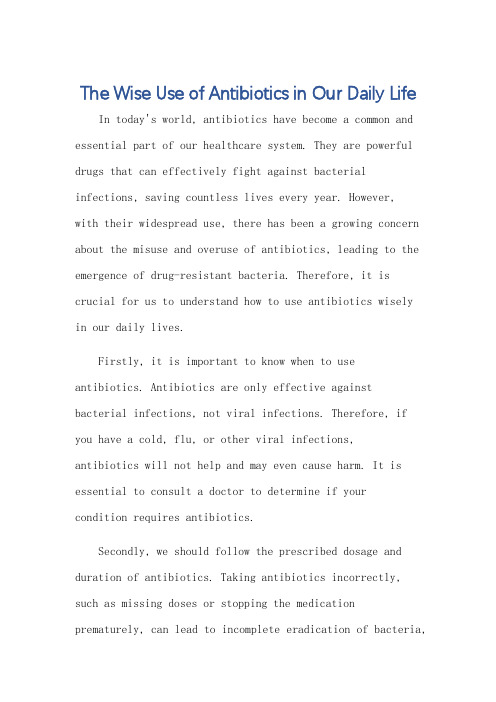
The Wise Use of Antibiotics in Our Daily Life In today's world, antibiotics have become a common and essential part of our healthcare system. They are powerful drugs that can effectively fight against bacterial infections, saving countless lives every year. However,with their widespread use, there has been a growing concern about the misuse and overuse of antibiotics, leading to the emergence of drug-resistant bacteria. Therefore, it is crucial for us to understand how to use antibiotics wiselyin our daily lives.Firstly, it is important to know when to useantibiotics. Antibiotics are only effective againstbacterial infections, not viral infections. Therefore, if you have a cold, flu, or other viral infections,antibiotics will not help and may even cause harm. It is essential to consult a doctor to determine if yourcondition requires antibiotics.Secondly, we should follow the prescribed dosage and duration of antibiotics. Taking antibiotics incorrectly, such as missing doses or stopping the medication prematurely, can lead to incomplete eradication of bacteria,allowing them to mutate and become resistant to the drug. This can result in longer and more severe infections in the future.Moreover, we should avoid self-medication with antibiotics. Many people tend to stockpile antibiotics and use them without consulting a doctor when they feel sick. This practice can lead to unnecessary exposure to antibiotics, increasing the risk of drug resistance. Additionally, different antibiotics have different spectra of activity and side effects, and self-medication may not be suitable for everyone.In addition to individual efforts, society also plays a crucial role in promoting the wise use of antibiotics. Governments and healthcare organizations should provide education and awareness-raising campaigns to inform the public about the correct use of antibiotics. Furthermore, policies and regulations should be implemented to restrict the sale of antibiotics without a prescription and promote the responsible prescribing of antibiotics by doctors.In conclusion, the wise use of antibiotics is crucial for maintaining the effectiveness of these drugs andpreventing the emergence of drug-resistant bacteria. By understanding when to use antibiotics, following the prescribed dosage and duration, avoiding self-medication, and promoting public education and awareness, we can contribute to the responsible use of antibiotics in our daily lives.**抗生素在日常生活中的明智使用**在当今世界,抗生素已成为我们医疗体系中常见且不可或缺的一部分。
滥用抗生素的英语作文
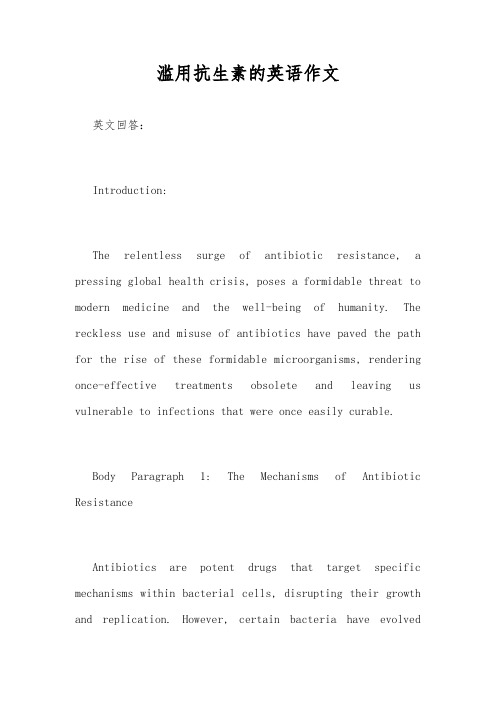
滥用抗生素的英语作文英文回答:Introduction:The relentless surge of antibiotic resistance, a pressing global health crisis, poses a formidable threat to modern medicine and the well-being of humanity. The reckless use and misuse of antibiotics have paved the path for the rise of these formidable microorganisms, rendering once-effective treatments obsolete and leaving us vulnerable to infections that were once easily curable.Body Paragraph 1: The Mechanisms of Antibiotic ResistanceAntibiotics are potent drugs that target specific mechanisms within bacterial cells, disrupting their growth and replication. However, certain bacteria have evolvedingenious strategies to evade these antimicrobial attacks. They may produce enzymes that break down or modify antibiotics, rendering them ineffective. Additionally, bacteria can alter their cellular structures, preventing antibiotics from entering or binding to their intended targets.Body Paragraph 2: Contributing Factors to Antibiotic MisuseThe inappropriate use of antibiotics is a multifaceted issue with numerous contributing factors. One major cause is the misguided self-medication practices among the public. Individuals often resort to taking antibiotics without consulting a healthcare professional, frequently driven by a desire for a quick fix or a misguided belief in the efficacy of these drugs against viral infections.Body Paragraph 3: The Consequences of Antibiotic ResistanceThe emergence of antibiotic-resistant bacteria has dire consequences for healthcare systems and public health. Standard treatments become ineffective, necessitating the development of newer and more expensive antibiotics, which may have increased side effects. Infections that were once easily treatable now pose significant challenges, leading to prolonged hospital stays, increased healthcare costs, and even death.Body Paragraph 4: Addressing the CrisisCombating antibiotic resistance requires a multi-pronged approach. Public awareness campaigns are essential to educate the populace about the responsible use of antibiotics and the grave repercussions of misuse. Healthcare providers must exercise prudence in prescribing antibiotics, reserving them for appropriate bacterial infections and following strict guidelines.Conclusion:The battle against antibiotic resistance is an ongoing one, demanding unwavering vigilance and collective action. By implementing prudent prescribing practices, promoting responsible use, and investing in research and development, we can safeguard the efficacy of antibiotics and preserve the health of present and future generations. Let us not succumb to complacency, for the stakes are too high. The consequences of antibiotic misuse are a stark reminder of the delicate balance between medical advancements and the unrelenting forces of microbial evolution.中文回答:引言:随着抗生素耐药性的不断增强,一场迫在眉睫的全球性健康危机正面临着严峻挑战,对现代医学和人类的福祉构成巨大威胁。
滥用抗生素作文英文
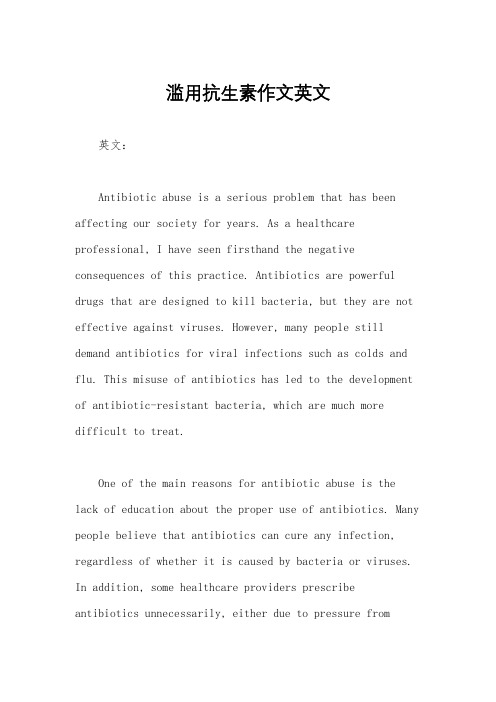
滥用抗生素作文英文英文:Antibiotic abuse is a serious problem that has been affecting our society for years. As a healthcare professional, I have seen firsthand the negative consequences of this practice. Antibiotics are powerful drugs that are designed to kill bacteria, but they are not effective against viruses. However, many people still demand antibiotics for viral infections such as colds and flu. This misuse of antibiotics has led to the development of antibiotic-resistant bacteria, which are much more difficult to treat.One of the main reasons for antibiotic abuse is the lack of education about the proper use of antibiotics. Many people believe that antibiotics can cure any infection, regardless of whether it is caused by bacteria or viruses. In addition, some healthcare providers prescribeantibiotics unnecessarily, either due to pressure frompatients or a lack of knowledge about the appropriate use of antibiotics.Another factor contributing to antibiotic abuse is the overuse of antibiotics in agriculture. Farmers often use antibiotics to promote growth in livestock, which can lead to the development of antibiotic-resistant bacteria in animals. These bacteria can then be transmitted to humans through the consumption of contaminated meat.To combat antibiotic abuse, education is key. Healthcare providers need to educate their patients about the appropriate use of antibiotics and the dangers of antibiotic resistance. In addition, strict regulations need to be put in place to limit the use of antibiotics in agriculture.In conclusion, antibiotic abuse is a serious problem that requires action from healthcare providers, patients, and policymakers. By working together, we can prevent the development of antibiotic-resistant bacteria and ensurethat antibiotics remain an effective tool in the fightagainst bacterial infections.中文:抗生素滥用是一个长期困扰我们社会的严重问题。
关于抗生素的高三英语作文
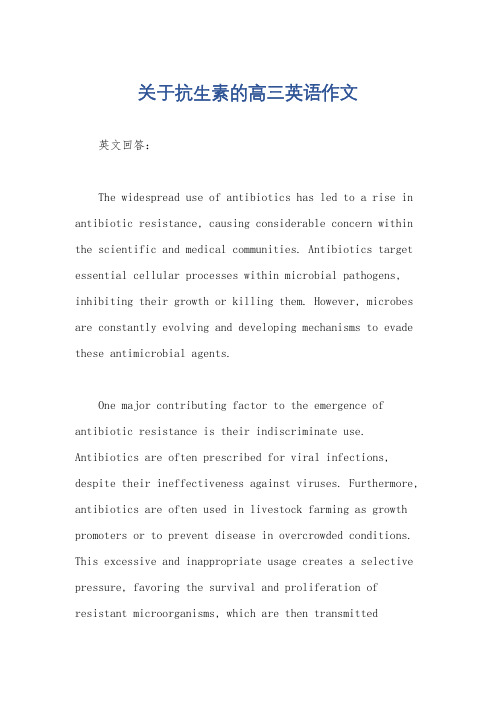
关于抗生素的高三英语作文英文回答:The widespread use of antibiotics has led to a rise in antibiotic resistance, causing considerable concern within the scientific and medical communities. Antibiotics target essential cellular processes within microbial pathogens, inhibiting their growth or killing them. However, microbes are constantly evolving and developing mechanisms to evade these antimicrobial agents.One major contributing factor to the emergence of antibiotic resistance is their indiscriminate use. Antibiotics are often prescribed for viral infections, despite their ineffectiveness against viruses. Furthermore, antibiotics are often used in livestock farming as growth promoters or to prevent disease in overcrowded conditions. This excessive and inappropriate usage creates a selective pressure, favoring the survival and proliferation of resistant microorganisms, which are then transmittedthrough food, water, or direct contact.The consequences of antibiotic resistance are far-reaching. It can compromise the effectiveness ofantibiotics in treating infections, prolonging illnesses, increasing healthcare costs, and potentially leading to treatment failure and even death. Resistant bacteria can spread rapidly within healthcare settings, causinghospital-acquired infections that are difficult to treat. Additionally, antibiotic resistance can contribute to the emergence of multidrug-resistant bacteria, which are resistant to a wide range of antibiotics.To combat antibiotic resistance, several strategies are being implemented. These include:Prudent antibiotic use: Antibiotics should be prescribed only when necessary and for the appropriate duration.Infection prevention and control: Implementing measures to prevent the spread of infections, such as handhygiene and vaccination, reduces the need for antibiotic use.Development of new antibiotics: Research is ongoing to develop new antibiotics that are effective againstresistant bacteria.Antimicrobial stewardship programs: Healthcare institutions implement policies to optimize antibiotic use and reduce prescribing errors.Public education: Raising awareness about the responsible use of antibiotics among healthcare professionals, patients, and the general public is crucial.Addressing the challenge of antibiotic resistance requires a multi-faceted approach involving healthcare professionals, policymakers, and the community. By promoting prudent antibiotic use, developing new antibiotics, and implementing infection control measures, we can preserve the effectiveness of these life-saving medications and ensure their availability for futuregenerations.中文回答:抗生素的滥用,导致细菌耐药性不断增长的罪魁祸首。
合理利用抗生素英文作文
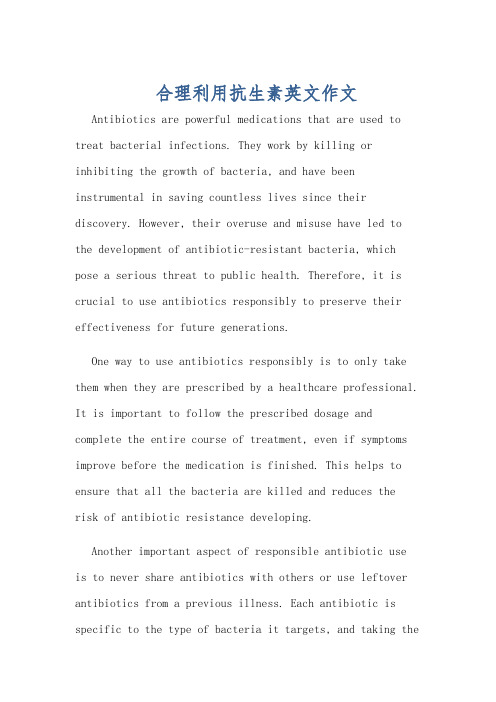
合理利用抗生素英文作文Antibiotics are powerful medications that are used to treat bacterial infections. They work by killing or inhibiting the growth of bacteria, and have been instrumental in saving countless lives since their discovery. However, their overuse and misuse have led to the development of antibiotic-resistant bacteria, which pose a serious threat to public health. Therefore, it is crucial to use antibiotics responsibly to preserve their effectiveness for future generations.One way to use antibiotics responsibly is to only take them when they are prescribed by a healthcare professional. It is important to follow the prescribed dosage and complete the entire course of treatment, even if symptoms improve before the medication is finished. This helps to ensure that all the bacteria are killed and reduces therisk of antibiotic resistance developing.Another important aspect of responsible antibiotic useis to never share antibiotics with others or use leftover antibiotics from a previous illness. Each antibiotic is specific to the type of bacteria it targets, and taking thewrong medication can be ineffective or even harmful. Additionally, it is important to never take antibiotics for viral infections, such as the common cold or flu, as they are not effective against viruses.In addition to taking antibiotics as prescribed, it is important to practice good hygiene to prevent the spread of bacterial infections. This includes washing hands regularly, covering the mouth and nose when coughing or sneezing, and avoiding close contact with people who are sick. By preventing infections in the first place, the need for antibiotics can be reduced.Furthermore, the use of antibiotics in agriculture and animal husbandry should also be carefully regulated to prevent the spread of antibiotic-resistant bacteria. This includes limiting the use of antibiotics in healthy animals for growth promotion, and only using them to treat diagnosed infections under the guidance of a veterinarian. Additionally, efforts should be made to improve animal welfare and hygiene practices to reduce the need for antibiotics in the first place.In conclusion, it is important to use antibiotics responsibly to preserve their effectiveness for future generations. This includes taking them only when prescribed, following the prescribed dosage, practicing good hygiene, and limiting their use in agriculture and animal husbandry. By working together to use antibiotics responsibly, we can help prevent the spread of antibiotic-resistant bacteriaand protect public health.合理使用抗生素是非常重要的。
抗生素 英语作文
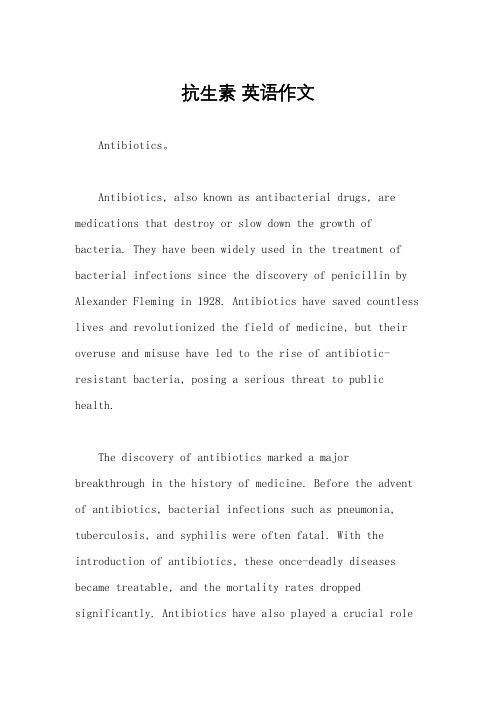
抗生素英语作文Antibiotics。
Antibiotics, also known as antibacterial drugs, are medications that destroy or slow down the growth of bacteria. They have been widely used in the treatment of bacterial infections since the discovery of penicillin by Alexander Fleming in 1928. Antibiotics have saved countless lives and revolutionized the field of medicine, but their overuse and misuse have led to the rise of antibiotic-resistant bacteria, posing a serious threat to public health.The discovery of antibiotics marked a major breakthrough in the history of medicine. Before the advent of antibiotics, bacterial infections such as pneumonia, tuberculosis, and syphilis were often fatal. With the introduction of antibiotics, these once-deadly diseases became treatable, and the mortality rates dropped significantly. Antibiotics have also played a crucial rolein modern medical procedures such as surgeries, chemotherapy, and organ transplants, as they help prevent and treat infections that may arise during these procedures.However, the overuse and misuse of antibiotics have led to the development of antibiotic-resistant bacteria. When antibiotics are used inappropriately or unnecessarily, such as for viral infections or in livestock farming, bacteria can develop resistance to the drugs. This means that the antibiotics become less effective in killing the bacteria, leading to prolonged illnesses, increased healthcare costs, and in some cases, death. The World Health Organization has warned that antibiotic resistance is one of the biggest threats to global health, and if left unchecked, it could lead to a future where common infections become untreatable.To combat antibiotic resistance, it is crucial for healthcare professionals and the public to use antibiotics responsibly. Healthcare providers should only prescribe antibiotics when necessary and ensure that the right antibiotic is prescribed at the right dose for the right duration. Patients should take antibiotics exactly asprescribed and never share or use leftover antibiotics. In addition, efforts should be made to improve hygiene and sanitation, as well as to develop new antibiotics and alternative treatments to combat resistant bacteria.In conclusion, antibiotics have revolutionized the treatment of bacterial infections and have saved countless lives. However, the overuse and misuse of antibiotics have led to the rise of antibiotic-resistant bacteria, posing a serious threat to public health. It is essential for healthcare professionals and the public to use antibiotics responsibly and take steps to combat antibiotic resistance. Only through collective efforts can we ensure that antibiotics remain effective in treating bacterial infections and continue to save lives.。
抗生素的滥用英语作文

Antibiotics are a class of drugs that are designed to combat bacterial infections. However,the misuse and overuse of these medications have become a significant global health concern.This essay will explore the implications of antibiotic misuse,the reasons behind it,and the potential solutions to this problem.The Consequences of Antibiotic Misuse1.Antibiotic Resistance:The most critical consequence of antibiotic misuse is the development of antibiotic resistance.When antibiotics are used inappropriately,bacteria can evolve to become resistant to these drugs,rendering them ineffective for future infections.2.Increased Health Risks:Misuse of antibiotics can lead to an increased risk of side effects and allergic reactions.Moreover,it can also disrupt the balance of the bodys microbiome,leading to other health issues such as gastrointestinal problems.3.Economic Impact:The cost of treating antibioticresistant infections is significantly higher than treating infections that are responsive to antibiotics.This places a financial burden on healthcare systems worldwide.Reasons Behind Antibiotic Misuseck of Awareness:Many people are not fully aware of the correct use of antibiotics. They may take them for viral infections,which are not affected by these drugs.2.Pressure from Patients:Some healthcare providers may prescribe antibiotics unnecessarily to satisfy patient demands for quick relief,even when they are not required.3.Aggressive Marketing:The pharmaceutical industrys marketing strategies can influence healthcare providers to prescribe antibiotics more frequently than necessary.Solutions to Antibiotic Misusecation and Awareness:Public health campaigns are essential to educate both the public and healthcare providers about the proper use of antibiotics and the dangers of misuse.2.Regulatory Measures:Governments can implement stricter regulations on the prescription and sale of antibiotics to ensure they are only used when necessary.3.Promoting Alternative Treatments:Encouraging the use of alternative treatments for minor ailments can reduce the reliance on antibiotics.4.Research and Development:Investing in research to develop new antibiotics and treatments for resistant bacteria is crucial to combat the growing issue of antibiotic resistance.5.Incentivizing Responsible Use:Healthcare providers can be incentivized to use antibiotics responsibly through various means,such as rewards or recognition programs.In conclusion,the misuse of antibiotics is a pressing issue that requires a multifaceted approach to address.By raising awareness,implementing regulatory measures,and promoting responsible use,we can work towards preserving the effectiveness of these lifesaving drugs for future generations.。
国际学术会议论文
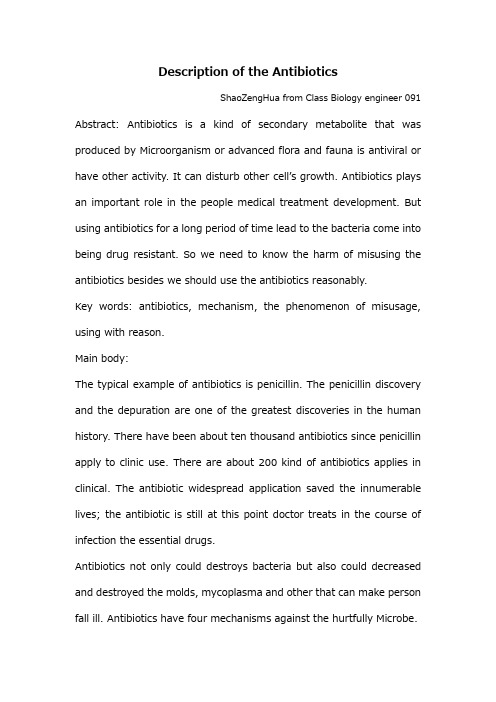
Description of the AntibioticsShaoZengHua from Class Biology engineer 091 Abstract: Antibiotics is a kind of secondary metabolite that was produced by Microorganism or advanced flora and fauna is antiviral or have other activity. It can disturb other cell’s growth. Antibiotics plays an important role in the people medical treatment development. But using antibiotics for a long period of time lead to the bacteria come into being drug resistant. So we need to know the harm of misusing the antibiotics besides we should use the antibiotics reasonably.Key words: antibiotics, mechanism, the phenomenon of misusage, using with reason.Main body:The typical example of antibiotics is penicillin.The penicillin discovery and the depuration are one of the greatest discoveries in the human history. There have been about ten thousand antibiotics since penicillin apply to clinic use. There are about 200 kind of antibiotics applies in clinical. The antibiotic widespread application saved the innumerable lives; the antibiotic is still at this point doctor treats in the course of infection the essential drugs.Antibiotics not only could destroys bacteria but also could decreased and destroyed the molds, mycoplasma and other that can make person fall ill. Antibiotics have four mechanisms against the hurtfully Microbe.1.Impeding the bacteria composite the cell wall, result in the bacteriablasting to death.2.Interaction with the bacterium cell membrane, the enhancementbacterium cell membrane's permeability, open on the membrane the ion channel, let the bacterium interior the useful material leak off the mycelium or electrolyte balanced being out of balance dies.e with the bacterium ribosome or its response substrate, to suppressthe protein mutually synthesis it is mean that the cell survival must the structure protein and the enzyme cannot synthesize.4.Impeding the DNA’s copy and transcription of the bacterium.Even though there are so many advantages of antibiotics there come out a phenomenon that as soon as we fall ill we will take many antibiotics. Than the bacteria have the drug tolerance. The super bacteria’s appear just was owing to the antibiotics’misusing. The other way, the antibiotics also have the adverse reaction. If we always misusing the antibiotics maybe have an exactly opposite effect. So we must use the antibiotics reasonable.1.If we can use lower level antibiotics than we do not use the higherlevel2.We should strictly according to what the doctor had said. Taking theantibiotics in accordance with what the doctor had said.3.Do not taking the antibiotics voluntary.4.Gives off heat reason unclear not to be suitable uses the antibioticexcept the condition to be seriously injured, and suspected highly for the bacterium infected person outside, gives off heat reason unclear not to be suitable uses the antibioticIn a word, antibiotic is a double-edged sword. If we use it with reason there will be fewer pains. But misusing the antibiotic and if it continue in this way, we will come back to the situation that we do not have any antibiotics to use in 40 years ago. So in my opinion using antibiotics reasonable is extremely.1. 能用窄谱抗生素就不用广谱的, 能用低级的就不用高级的。
滥用抗生素的英语作文
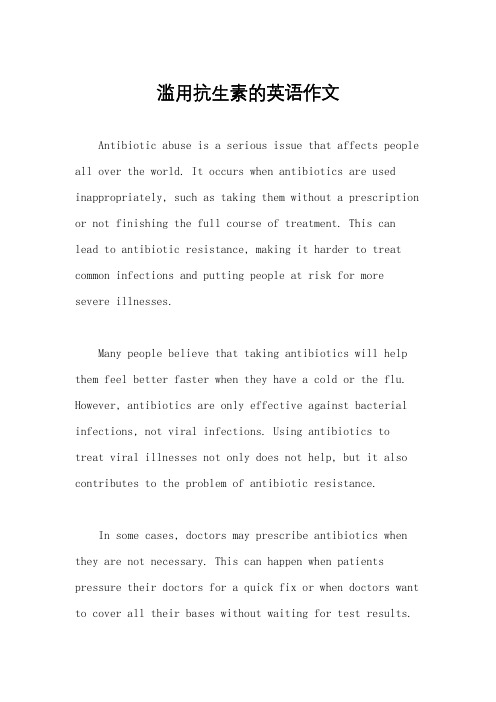
滥用抗生素的英语作文Antibiotic abuse is a serious issue that affects people all over the world. It occurs when antibiotics are used inappropriately, such as taking them without a prescription or not finishing the full course of treatment. This can lead to antibiotic resistance, making it harder to treat common infections and putting people at risk for more severe illnesses.Many people believe that taking antibiotics will help them feel better faster when they have a cold or the flu. However, antibiotics are only effective against bacterial infections, not viral infections. Using antibiotics totreat viral illnesses not only does not help, but it also contributes to the problem of antibiotic resistance.In some cases, doctors may prescribe antibiotics when they are not necessary. This can happen when patients pressure their doctors for a quick fix or when doctors want to cover all their bases without waiting for test results.Overprescribing antibiotics can lead to the development of resistant bacteria, making it harder to treat infections in the future.The consequences of antibiotic abuse are far-reaching. Not only does it make it harder to treat common infections, but it also increases healthcare costs and can lead to longer hospital stays. In severe cases, antibiotic resistance can lead to life-threatening infections that are difficult or impossible to treat.To combat antibiotic abuse, it's important for healthcare providers to educate their patients about the appropriate use of antibiotics. Patients should understand that antibiotics are not always the answer and that they should only be used when prescribed by a doctor for a bacterial infection. Additionally, more research and development is needed to create new antibiotics and alternative treatments to combat antibiotic resistance.In conclusion, antibiotic abuse is a serious issue that can have dire consequences for public health. It'simportant for both healthcare providers and patients to work together to ensure that antibiotics are used appropriately and responsibly. By doing so, we can help preserve the effectiveness of these life-saving medications for future generations.。
关于抗生素的英语作文
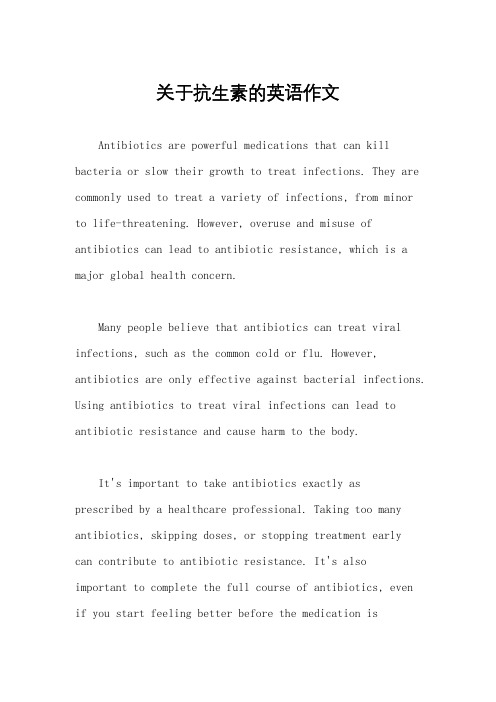
关于抗生素的英语作文Antibiotics are powerful medications that can kill bacteria or slow their growth to treat infections. They are commonly used to treat a variety of infections, from minorto life-threatening. However, overuse and misuse of antibiotics can lead to antibiotic resistance, which is a major global health concern.Many people believe that antibiotics can treat viral infections, such as the common cold or flu. However, antibiotics are only effective against bacterial infections. Using antibiotics to treat viral infections can lead to antibiotic resistance and cause harm to the body.It's important to take antibiotics exactly asprescribed by a healthcare professional. Taking too many antibiotics, skipping doses, or stopping treatment earlycan contribute to antibiotic resistance. It's alsoimportant to complete the full course of antibiotics, evenif you start feeling better before the medication isfinished.Antibiotic resistance occurs when bacteria change in response to the use of these medicines. Bacteria become resistant to the antibiotics used to treat them, making the infections they cause harder to treat. This can lead to prolonged illness, more doctor visits, and the need for more expensive and toxic medications.In order to combat antibiotic resistance, it's important for healthcare professionals and patients to work together to use antibiotics responsibly. This includes using antibiotics only when necessary, and using the right antibiotic for the right amount of time. It's also important to prevent infections through vaccination, hand washing, and other good hygiene practices.In conclusion, antibiotics are important medications that have saved countless lives. However, it's crucial to use them responsibly to prevent antibiotic resistance. By working together, we can ensure that antibiotics remaineffective in treating bacterial infections for years to come.。
远离抗生素的坏处英语作文
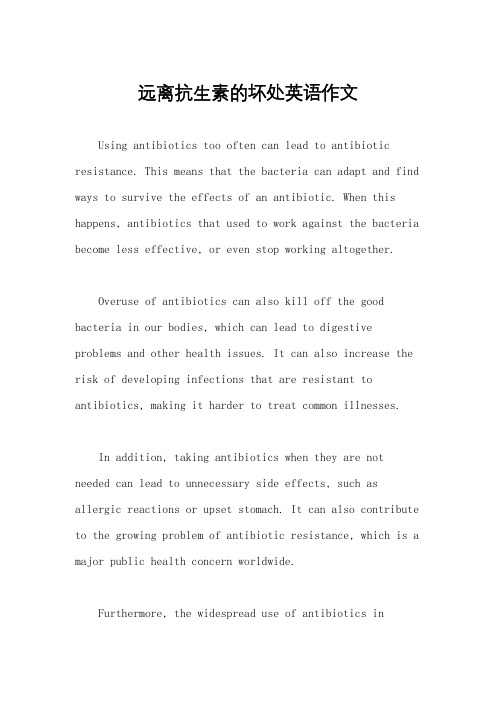
远离抗生素的坏处英语作文Using antibiotics too often can lead to antibiotic resistance. This means that the bacteria can adapt and find ways to survive the effects of an antibiotic. When this happens, antibiotics that used to work against the bacteria become less effective, or even stop working altogether.Overuse of antibiotics can also kill off the good bacteria in our bodies, which can lead to digestive problems and other health issues. It can also increase the risk of developing infections that are resistant to antibiotics, making it harder to treat common illnesses.In addition, taking antibiotics when they are not needed can lead to unnecessary side effects, such as allergic reactions or upset stomach. It can also contribute to the growing problem of antibiotic resistance, which is a major public health concern worldwide.Furthermore, the widespread use of antibiotics inagriculture has led to the presence of antibiotic residues in food products, which can pose a risk to human health. Consuming these residues can contribute to the development of antibiotic resistance and other health problems.In conclusion, the overuse and misuse of antibiotics can have serious consequences for both individual health and public health. It is important to use antibiotics only when necessary and as prescribed by a healthcare professional, and to take steps to prevent the spread of antibiotic-resistant bacteria.。
- 1、下载文档前请自行甄别文档内容的完整性,平台不提供额外的编辑、内容补充、找答案等附加服务。
- 2、"仅部分预览"的文档,不可在线预览部分如存在完整性等问题,可反馈申请退款(可完整预览的文档不适用该条件!)。
- 3、如文档侵犯您的权益,请联系客服反馈,我们会尽快为您处理(人工客服工作时间:9:00-18:30)。
Abuse of Antibiotics【keywords】:Abuse Overuse of Antibiotics Public Health Crisis【Introduction】EVERY year 80,000 Chinese die from antibiotics abuse, making China one of the worst offenders in the world.Statistics show that among the country's 15 best-selling medicines, 10 are antibiotics. More than 50 per cent of the medical expenses for Chinese in-patients goes to cover different kinds of antibiotics, while the figure in Western countries is just 15 to 30 per cent.The side effects of antibiotics use can damage organs, cause disorders in the body's normal bacteria and increase the resistance of disease causing germs.Many Chinese believe the myth that antibiotics can diminish inflammation, so they use them to treat everything from toothache to fever.【the main text】Before the discovery of antibiotics in the 1940s, millions of people died routinely of staphylococcus and streptococcus and more serious bacterial infections like meningitis, pneumonia and tuberculosis. But over the years, antibiotics have become less effective because some bacteria have developed ways to survive the medicines meant to kill or weaken them. VOA's Rosanne Skirble reports on how the overuse and abuse of antibiotics is creating a public health crisis and how some communities are responding to it.Bacteria comprise about one-20th of our body weight. Most of these organisms are harmless, like those in the intestinal tract that help us to digest our food. Others can make us really sick. Streptococcus is a common bacteria found on the skin and in the nose, even in healthy people. But it can also cause acute respiratory illness, sinusitis, some ear infections and pneumonia.Over the last 60 years, most serious bacterial infections have been treated with some type of penicillin-related antibiotic. Today penicillin is not as effective as it once was. Drug-resistant bacteria are to blame. We are all at risk of getting an untreatable infection because it is the bacteria and not the person that becomes resistant to antibiotics. And those bacteria can be spread by simple physical contact.Antibiotic resistance is not new, but what is troubling is that the number of drug-resistant bacteria is growing at the same time that the drugs used to combat them are decreasing in potency and number.A new study released by the Alliance Working for Antibiotic Resistance Education, better known as AWARE, tracks the effectiveness of penicillin against Streptococcus pneumonia, a common bacterial cause of meningitis, ear infections, pneumonia and sinusitis.It reports that in Northern California, drug-resistant cases fell from 27 percent of all infections in 2000 to 19 percent in 2002. In Southern California resistance remained at 27 percent, still lower than the 30 percent national average.The decline is good news and in part due to the work of AWARE, a statewide partnership that includes physician organizations, health agencies, healthcare providers and consumer and education groups. Elissa Maas is the executive director."The overall goals of AWARE are really three: to increase the appropriate prescribing of antibiotics, to increase the public's awareness of the importance of the issue of both appropriate use antibiotic and antibiotic resistance and then mobilizing communities to take action."The U.S. Centers for Disease Control and Prevention estimates that 50 percent of antibiotic use may be inappropriate. Elissa Maas says AWARE targets doctors who over-prescribe antibiotics and consumers who routinely demand them for everything from a headache to the common cold. "It is about not asking for an antibiotic when we have a cold or flu bug and we go in and we want that from the doctor. We do not need it. It will not work. And, so part of this [work] is just hammering those messages over and over because they are simple behaviors that can solve the problem," she says.And that means bombarding citizens with information in public service announcements heard on radio stations across California.Other simple behavior changes include using the entire prescription and not saving or sharing the drugs with anyone. Taking an antibiotic in too small a dose or for too short a time allows the bacteria to develop mutations or to acquire drug resistance from other bacteria.A World Health Organization report recommends aggressive action to combat drug resistant infections, which it says, "could rob the world of its opportunity to cure illnesses and stop epidemics."The Centers for Disease Control and Prevention has initiated a campaign for the appropriate use of antibiotics, of which the California AWARE program is part. The solution, says AWARE executive director Elissa Maas requires a collaborative effort."I can't stress enough the word 'partner.' This issue is so gargantuan that no one organization is going to solve it," she says. " We have got to have the doctors involved. We have got to have the pharmacists, and nurses. We have to have the health plans. We have got to have the pharmaceutical companies. We have got to have consumer groups. We have to have the media. Everybody has to sit there and say, 'Oh my gosh, we have a problem.'"And from that realization, Elissa Maas hopes, will come aggressive programs that the World Health Organization is urging, to ensure that the drugs we have today will be available to fight tomorrow's infections.I am Rosanne Skirble.The Dangers Of Prescribing AntibioticsErythromycin is a commonly used antibiotic, but new research suggests it could be dangerous when used in combination with other drugs.// The study shows patients should not be given erythromycin along with antifungal agents such as diltiazem, verapamil and troleandomycin because it increases the risk of sudden death.Researchers conducted the study to determine if there is any association between the use of erythromycin and sudden cardiac death. Researchers used information on 1,476 cases of confirmed sudden death due to cardiac causes. They looked at what medications the patients were on including the drugs erythromycin or amoxicillin.Amoxicillin is another commonly used antibiotic, but does not have the same effect on the heart as erythromycin.The rate of sudden death from cardiac causes among patients on erythromycin was twice as high compared to those who had not used any antibiotics. The research also shows the rate of sudden death from cardiac causes was five-times as high among patients on erythromycin and a CYP3A inhibitor however there was no increased risk of death among patients on amoxicillin.Thus researchers say the combination use of these drugs should be avoided and researchers say there are alternative drugs that doctors can prescribe without putting patients at a higher risk for sudden death.The Hidden Dangers of AntibioticsAntibiotics, meaning literally “against life” were invented to kill the invading bacteria that our own immune system has failed to destroy, resulting in bacterial infections somewhere in the body. Most of us would not be here today if not for the benefits of antibiotics. However, there is a disturbing down side to the use and overuse of antibiotics. Antibiotics are ingested to kill off bad bacteria, but are in fact ruthless killers of all bacteria in the body both good and bad. When they set off in the blood stream to kill bacterial invaders they have no understanding of which bacteria are invading and which are immune system supporters. They are not thinkers, they are killers. When the bad bacteria are sufficiently killed, we regain our wellness as the infection heals.However, what we cannot see or feel is the devastation of the intestinal “friendly flora” or good bacteria which resides in the surrounding area of the GI tract. When the friendly flora is depleted and cannot effectively communicate with the white blood cells we have been set into a cycle of a weakened immune system. This break down in communication makes us even more vulnerable to new invading bacteria. Our white blood cells then cease to communicate effectively with each other, allowing the chance of both viral and bacterial infection to greatly increase. If you have ever taken antibiotics in your lifetime it is crucial to take probiotics daily there after. Avoiding probiotics supplements is an invitation to the contraction of more and more illness and disease. If you are eating yogurt that is high in sugar to replenish your friendly flora it unfortunately is doing little good. Sugar kills good bacteria, so this commercial venture is simply hype.Antibiotics should be taken with extreme caution. Since antibiotics do not kill viral infections, taking them for viruses such as the flu serves only to wipe out even more friendly flora, further compromising your immune system. Not taking the fully prescribed amount of antibiotics for an infection such as strep throat or a sinus infection because you “feel much better” is a disastrous choice. If all bad bacteria are not killed, they will mutate. This is how the antibiotic resistant mutant “superbugs” are developed. (This is also true of hand sanitizers and househ old cleaners. What doesn’t get killed, mutates.) Sinus and ear infections that needmore than one round of antibiotics are the perfect example. Flesh eating staph infections like MRSA is one of the worst, killing more people last year in the US than Aids. And it is on the rise.True “universal” health care involves each person approaching their own health appropriately. The way you choose to approach your health has an invisible yet crucial domino effect on the entire world. Your choices matter!*Please know that I am not a medical doctor or a health practitioner. I cannot diagnose your stomach problems nor can I guarantee a cure. I am here to share my knowledge, which applications have worked for me and to offer suggestions of where you may go physically, emotionally and spiritually for healing and self-empowerment. If you choose to explore alternative medicine, do not independently stop taking your prescribed medications. Always consult with your current doctor as well as your new practitioner when changing your medical program.。
